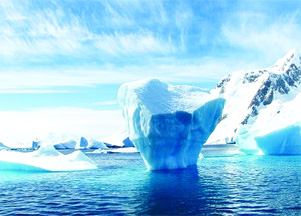
As the world prepares for the COP28 climate conference in Dubai, a stark reminder of the climate crisis’s impact comes from Antarctica, where scientists have observed a dramatic event: the collapse of the ice shelf extending from Cadman Glacier on the west Antarctic Peninsula.
This collapse has left the glacier vulnerable to the ocean’s warm waters, resulting in an accelerated retreat that signals a worrying trend in polar ice dynamics. The findings, published in Nature Communications, are the result of meticulous research by an international team from the University of Leeds, Lancaster University, ENVEO, the University of Delaware, and the British Antarctic Survey.
Utilising data from nine satellite missions, including ESA’s CryoSat and Europe’s Copernicus Sentinel-1, the researchers were able to track significant changes in the ice shelf and glacier over time.
Their analysis revealed that between November 2018 and May 2021, Cadman Glacier retreated by an astonishing eight kilometers after remaining stable for approximately half a century. The rapid change is attributed to ocean water temperatures around the west Antarctic Peninsula that were up to 2°C warmer than average during 2018–2019.Benjamin Wallis, a researcher from the University of Leeds who led the study, shared insights into the mechanisms behind this dramatic shift. According to Wallis, the warmer waters likely began undermining the Cadman Ice Shelf as early as the 1970s, with the effects becoming pronounced by the early 2000s.
The warmth penetrated not just the surface but also the deeper layers of the ocean, potentially reaching the point where the ice shelf was grounded on the seafloor. This bottom-up melting was captured through satellite observations.
Ice shelves play a crucial role in the stability of glaciers; they act as a buttress, floating on the ocean surface and sometimes anchoring to the ocean floor, which slows down the flow of glacial ice toward the sea. The loss of the Cadman Ice Shelf has removed this critical support, allowing the glacier to discharge more ice into the ocean at an alarming rate.
The implications of this research are profound. It underscores the sensitivity of Antarctic glaciers to oceanic temperature changes and highlights the potential for rapid ice loss in response to climate change.
As global leaders convene to discuss climate action, the situation in Antarctica serves as a powerful call to address the warming oceans that threaten not only polar regions but global sea levels and ecosystems.
Source: India Today





Be the first to comment